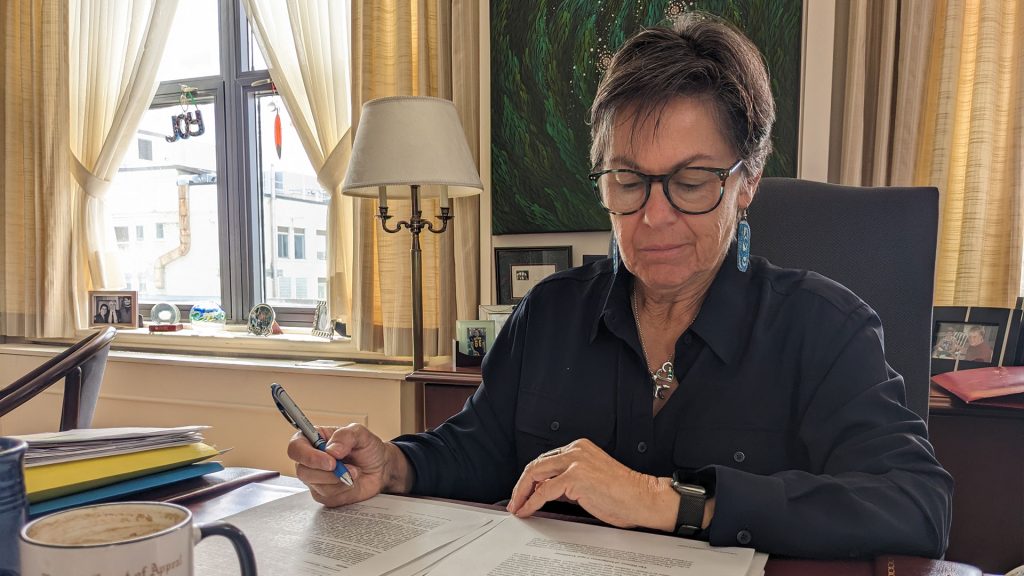
Sen. Kim Pate reads a letter from an incarcerated person in her Ottawa office. Photo: Mark Blackburn/APTN News
Independent senator Kim Pate says federal inmates view Canada’s medical assistance in dying law or MAiD as a way to reunite with their families.
Before leaving prison for good.
“They are dying to get out,” says Pate, with no pun intended.
“They can’t get out on parole and it’s the only way to have family around – even if they could have lived longer.”
APTN News was the first to report in April that nine inmates used medical assistance in dying – known by the acronym MAiD – between Nov. 1, 2016, when the law first came into effect, and March 31, 2022, the most recent reporting period, according to statistics provided by the Correctional Service of Canada (CSC).
CSC, however, confirmed that there have been no additional deaths since then.

Pate, a long-time prisoners’ advocate with the Elizabeth Fry and John Howard societies before being appointed to the Senate in 2016, continues to be a voice for the incarcerated.
She says inmates have always written to her, but their letters and emails are darker since assisted-death was legalized in June 2016.
“They write to me about how they fear they’re going to die in prison,” says Pate, who responds to each message with a handwritten note. “Now they want to use MAiD.”
Canada first offered legally-assisted death to adults living with terminal illnesses, then serious and chronic physical conditions. This year, it was supposed to be people with certain mental illnesses, but the Trudeau government delayed the move for two years over fears it would be too easy for vulnerable people to die.
Pate, who has no personal objection to MAiD, says a third of Canada’s 13,000 inmates live with a mental health condition.
“Mental health supports for prisoners have long been an issue,” she notes. “People in segregation, most of them had mental health diagnoses.
“They know they’re going to die in prison and lose such hope.”

Initially, 27 inmates applied for MAiD, says the CSC. Of the nine deemed eligible, APTN learned all were male and some were Indigenous.
That some were Indigenous is not unusual given the over-representation of Metis, Inuit or First Nations prisoners nationally. Figures released by the Office of the Correctional Investigator show 33 per cent of inmates are Indigenous.
Pate, an independent senator from Ontario who continues to be a voice for the incarcerated, is worried about vulnerable inmates who are being influenced by others on the inside.
It’s something she hears from inmates and feels is causing further harm to already traumatized people.
“They’re learning about (MAiD)…from staff members (correctional officers),” says Pate, noting “I can’t imagine speeding up your death.
“People are suffering. They feel that ‘if I’m going to die in segregation, I’d rather (apply for MAiD and) see my family than die alone.’”

Pate blames the conditions of confinement, something Correctional Investigator Ivan Zinger described in his annual report of 2022.
Zinger reported that Indigenous and Black prisoners were subjected to “discrimination, stereotyping, racial bias and labeling.” He said they were over-represented in maximum security, served more of their sentence at higher-security levels, were subjected to more use-of-force incidents, experienced more involuntary transfers, incurred more institutional charges and spent more time in intervention units.
“The conditions of confinement are such that they’d rather be dead than wait for relief in prison,” says Pate, who is a lawyer and was executive director of the Canadian Association of Elizabeth Fry Societies from 1992 to 2016.
“They see no other choice.”
Pate says vulnerable prisoners should be offered ways to improve their mental health and get out of prison instead of MAiD.
To increase awareness of dire prison conditions, Pate founded the program Senators Go to Jail. She says 34 of her peers have taken advantage of their ability to visit any penitentiary and participated so far.
“In no way will I let the government off the hook,” she adds.
“I cannot support that we are moving to the stage where it’s easier to die (in prison) than it is to live.”
This is the second in a series about MAiD in prison. Here is Part 1.
Editor’s note: The story was corrected at 8:33 CT on 5/16/23 to report there have been no additional deaths by MAID since March 27, 2022.










